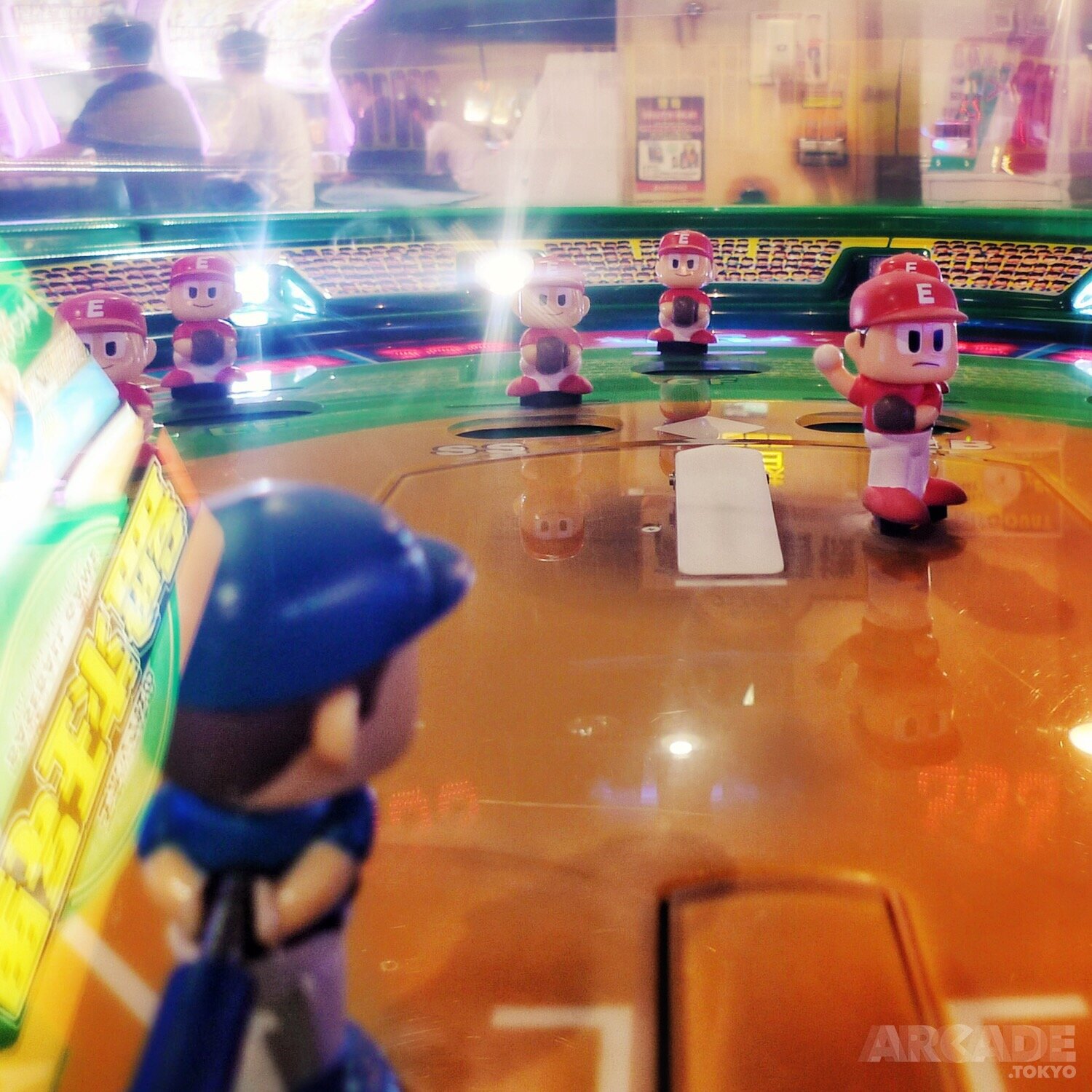Warehouse Games: Plastic Baseball Dudes?!

On 17 November 2019, Warehouse Kawasaki closed down.
In tribute, Arcade Tokyo is running a series of posts about this legendary arcade and its games.
This fourth post covers Yakyuuban, one of the nuttiest arcade machines you’ll see.
I can’t imagine this ever showing up in any other arcade, so let me introduce you and then we can all say goodbye together.
- - -
Yakyuuban
Does this even count as a videogame? It’s in the game centre, you put a coin in, and a computer makes it work. But you’re not looking at a screen, and the physics model is just actual physics. But then again it *could* have been on a screen. That counts, right?
Japaneseness
Perhaps you’re aware that baseball is very popular in Japan. I wasn’t before I went there. It’s got a pretty strong claim to being the national sport, with two professional leagues and a national team that has always put in a good showing at the World Baseball Classic, which is an actual international tournament (unlike the World Series).
Japan’s arch rivals in the sport are South Korea, whom they defeated in the final of the 2009 Classic. I didn’t know *they* liked baseball either, until the Koreans in my Japanese class got a major ribbing from the teacher. And they just had to suck it up because at that stage we couldn’t speak Japanese.
Anyway, so *that’s* why there are so many Japanese baseball games I’ve never bothered to play – and all those baseball cameos in things like Rhythm Tengoku, WarioWare and Bishi Bashi.
What’s interesting about this game (Yakyuuban) is that it was never even supposed to be an arcade thing. Apparently, Epoch Co., the makers of this machine, have been making home versions of tabletop baseball since 1958. Here’s Epoch’s website, with a video of scary child models playing the latest home version in a completely bare room. The jumbo monster version we’re looking at here was a one-off 50th anniversary special, released into Japanese arcades in 2008.
Take me out to the baseball match
So, what’s it like? Should we be dropping our ¥100s in this thing? Is it a field of dreams? Is it in a league of its own? Am I a fan (like in ‘The Fan’)?
Yakyuuban goes on a bit too long, has minimal action, is low-scoring, highly repetitive, difficult, confusing, and pretty boring. I’m sure it will appeal to baseball fans the world over.
Hey-oh.
Who-poch?
Epoch Co. sounded sort of familiar, I thought, so I did a little digging. The company was founded in 1958 in order to sell Yakyuuban, and they still sell that and a ton of other tabletop games in Japan, including 23 licensed Super Mario play sets.
What’s more, they’re responsible for having unleashed Sylvanian Families on the world, which have turned out to have a half-life of greater than 34 years.
Sure enough, though, their Wikipedia page lists a load of videogames, too, including some notable ones. R-Type DX, yes; Gauntlet Legends, yes. None as notable, however, as the Barcode Battler handheld console system, which I actually owned. Barcode Battler interpreted the information stored in everyday barcodes and represented it as fighters facing off in deadly battles. We would collect any barcoded packages we could get our hands on, and pit cornflake boxes against vacuum cleaner bags against 4-packs of toilet fresheners, all in search of the ultimate undefeatable champion warrior grocery item.
Epoch Co.’s Milky Princess for the Super Cassette Vision. Source
I have an awkward memory of discovering the intimidating power of my mother’s feminine hygiene products. I suppose I could have just cut out the barcode and not carried the whole wrapper around. Still, a winner’s a winner, and this was the Shao Kahn of barcodes.
So Epoch’s had a *remarkable* history, even if *illustrious* is perhaps too strong a word.
Thinking
Epoch’s crossover between games mechanical, electronic, and video got me thinking of Nintendo, who famously progressed from hanafuda cards onto electronic toys, before defining an era of videogaming.
So I guess this makes Epoch like a shit Nintendo – which is a pretty good thing to be a shit one of, so nice going!
Photographer and writer covering Tokyo arcade life – the videogames, the metropolis and the people








